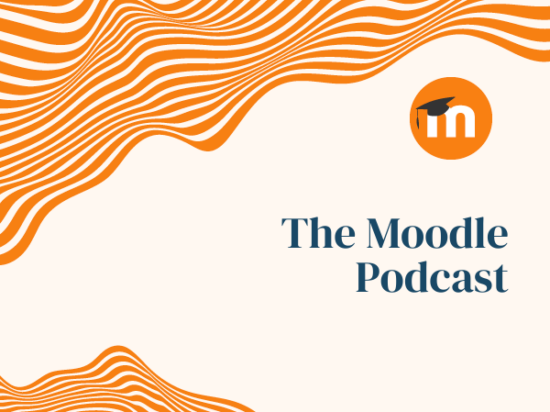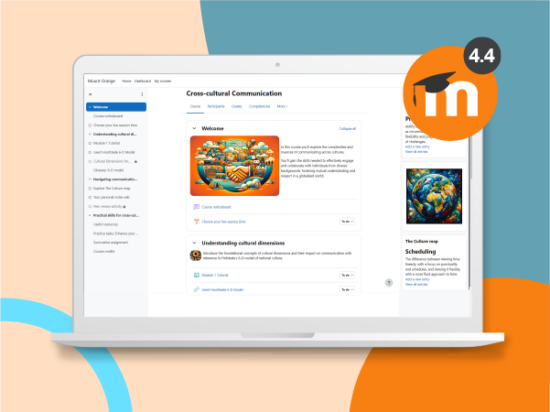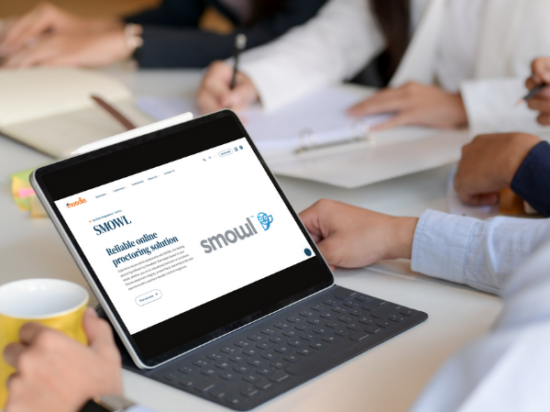Meet Nicolas Martignoni, the Swiss educator who has contributed significantly to Moodle’s success. In this interview, he’ll dive into his background and his contributions to the Moodle community, including the creation of MoodleBox, which aims to bring eLearning to those with limited access to infrastructure and resources.
Could you tell us a bit about yourself, including your background, interests, and what you’re currently passionate about?
My name is Nicolas Martignoni. I’m married to Caroline and father of two. I’m a 59-year-old living in Fribourg, Switzerland. My first language is French. I have a master’s degree in Mathematics and Computer Science, with a background in Classics. My day job is as a math and computer science teacher in a local secondary school.
I also work part-time as a teacher trainer. I teach educators how to instruct with Moodle, online privacy, security and data protection and more.
I’m very passionate about the topic of equality and freedom in the digital world, particularly digital sovereignty in a world dominated by big technology companies and governed by surveillance capitalism. Music is also really important to me. I love singing: I’m a baritone in an oratorio choir in my hometown and in my school choir. I’m also part of the organising team for a classical music concert festival.
You have a fascinating background! How did you first become involved with Moodle?
In 2002, along with teaching, I was employed by a government agency called a competence centre and was in charge of all aspects of digital technology in schools. This role essentially consisted of providing advice on digital technology in several schools (K-12 -> College) for about 50,000 students. At the time, we were looking for a learning management system (LMS) to help us deliver online courses more effectively. When I was asked to evaluate several platforms, I looked around for FOSS (Free and Open Source Software) options, and that’s how I first came across Moodle.
At that time, the platform was still in development and the release of its beta version. I really liked the fact that it was well-programmed and led with a very good vision. Furthermore, the user community was already pretty active. Moodle suited my teaching straight away, and it was easy and intuitive for the students to use. I adopted it immediately and recommended it to my faculty.
From there, what inspired you to become an active contributor to the Moodle community?
As I used Moodle in my teaching, I realised that, at that time, the French translation was rather incomplete, and this was a challenge for my students. As Moodle is an open-source software, I was able to translate the missing strings myself, and in 2003, I took the opportunity to contribute my translations to the Moodle community. This was the beginning of my journey with the platform. I got hooked and finished translating Moodle into French. At the same time, I got involved in the French-speaking Moodle user community (at this point, very small), and Moodle CEO Martin Dougiamas gave me moderation rights in the French discussion forums.
Since 2003, I’ve been the main facilitator of the Moodle French-speaking community and the French language pack maintainer of Moodle. I’ve also been awarded as a ‘Particularly Helpful Moodler’ (a recognition from Moodle HQ that acknowledges the commitment from the most helpful and active members of the Moodle community) consecutively each year since 2013. I’m involved in testing future releases of Moodle, and I occasionally develop plugins or fix bugs in the platform.
The friendliness and efficiency of the community and Martin’s trust were major sources of inspiration for me to keep contributing to the development of the LMS.
Last but not least, I created MoodleBox in 2016.
Tell us about the MoodleBox project! What inspired you to create it?
MoodleBox is a project making it possible to use an LMS in places where the infrastructure does not allow a server, or there is no sufficient Internet connection. The idea is to provide e-learning where the conditions don’t allow for it, such as in developing countries or locations affected by disasters.
I released MoodleBox in 2016 under a General Public License, enabling it to be extended and improved by anybody, just like Moodle. It was and still is important for me that no one (including me) should be able to appropriate this tool, as it is intended for the most disadvantaged.
MoodleBox is now used all over the world, and I’m very proud of this achievement: having helped disadvantaged people gain access to learning is a great feeling for me. And it’s very rewarding to see it adopted in totally unexpected ways: for instance, it is used to give inmates in detention centres in France access to the same course content as at the university.
MoodleBox is essentially a one-man project, although I can count on some enthusiastic supporters in the Moodle community. I can also count on the support of MoodleHQ, as they have allowed this project to have the rare privilege of using the word “Moodle” for its name and its communication.
Thank you for sharing and for your incredible vision and dedication to improving educational outcomes. Because you use Moodle in many different ways, could you share some of your favourite Moodle features or plugins?
I try to use mainly the built-in features: my school is quite conservative in terms of plugin installation, and due to this, the best option for us is to use the core platform features. But this hasn’t been a challenge so far since there are so many possibilities with Moodle’s built-in features, and I will name just a few of them below!
The most important for me is that it does not impose any particular teaching style: this allows me to use it in entirely different situations, such as project supervision, formative assessment, group discussions, teacher training, and so on.
As a mathematician — one of my favourite plugins is the STACK question type: this fantastic piece of software is truly a gem for Math teaching despite the steep learning curve, and I’m currently lobbying to get it installed on my school Moodle server.
But the fact that Moodle is an open-source software is my favourite feature by far.
Absolutely. We’re committed to Moodle LMS remaining open-source. What sets Moodle apart for you compared to similar LMSs or open-source projects?
First of all, and without hesitation, its users and developers community. Sure, Moodle is an amazing tool, but the big difference with other software or projects is the friendly and supportive nature of its user community and the involvement of its developers community. The high quality of the discussions on the Moodle.org forums, their conviviality and constructive spirit, and the motivation and competence of Moodle community developers. All of this makes Moodle even better.
Second, Martin Dougiamas‘ leadership. Martin’s approach to development decisions for Moodle, always prioritising student learning, has empowered both Moodle and its community of users and developers to flourish.
How has the open-source community aspect of Moodle influenced your work and contributions to the platform?
In a fundamental way, for me, the free (as in free speech) nature of a FOSS like Moodle LMS is essential. When contributing, I want my work (which is usually voluntary in this context) to benefit everyone, and it’s important that no one should be able to appropriate it and deprive others of it. I’ve contributed to other FOSS projects in the same spirit.
I think it has a lot to do with the way I think about learning: a day without learning is a day wasted. I learned a lot from the contributions of the other people involved in the project and from others in general. Participating in a project is a way for me to give something back in the hope of enabling others to learn in their turn. Developing or contributing without being able to share it for the benefit of the general public is of no interest to me.
Building upon your collaborative ethos within the digital space of Moodle, you’ve also taken the initiative to foster the community locally by organising MoodleMoots. Could you share your favourite aspects of these events and how they impact the local Moodle community?
On-site MoodleMoots are essential to the life of the Moodle community. This is where people meet in real life to discuss their practices and share their experiences, and these people-to-people encounters boost the community’s strengths. Through this sharing, each new MoodleMoot really enhances the quality of the connections in the community, and these connections continue all throughout the year in the Moodle.org forums. It’s truly amazing to see it happen year after year since 2005.
For me, the most important part is the socialising before, between and after the talks. Of course, it’s the presentations that make up the substance of each MoodleMoot. But these opportunities to socialise at the conference are also very productive and valuable.
In the French-speaking MoodleMoots, despite the very large number of participants (more than 500), we have succeeded in preserving the convivial touch that makes the event so special and unique among other such conferences, and I’m very proud of it.
As a passionate advocate for Moodle, what challenges or obstacles do you think the platform may face in the future, and how can they be addressed?
I think the biggest challenge for the future of Moodle is not on the outside but on the inside. As the most widely used LMS in the world, Moodle faces the need to continue to grow while never forgetting that its strength lies in its users, translators, and developer community. MoodleHQ needs to take care of all the people who give up their time for their favourite LMS. It must value the contributions of these invaluable people and not forget that it lives and breathes in large part thanks to them.
Of course, keeping up with the competition is important, but without losing your soul.
You are also a moderator in the Moodle.org community forums. What advice would you give to newcomers looking to get involved and contribute effectively?
Don’t be shy, participate, and ask good questions! Clearly and precisely formulate the issue you are dealing with. Read existing discussions to understand how to do this efficiently. Many contributors engage in a rich exchange of ideas, which, although it may involve some back and forth, ultimately leads to a deeper understanding. This iterative process also reflects the generous spirit of those who dedicate their time to assisting others and enriching the community as a whole.
Nicolas Martignoni’s story showcases the impact of community involvement in shaping the future of education. His contribution to Moodle’s French-speaking community and the development of MoodleBox have made a difference in providing access to education. Nicolas’ journey with Moodle is a testament to the importance of collaboration. We thank Nicolas for his contributions.



